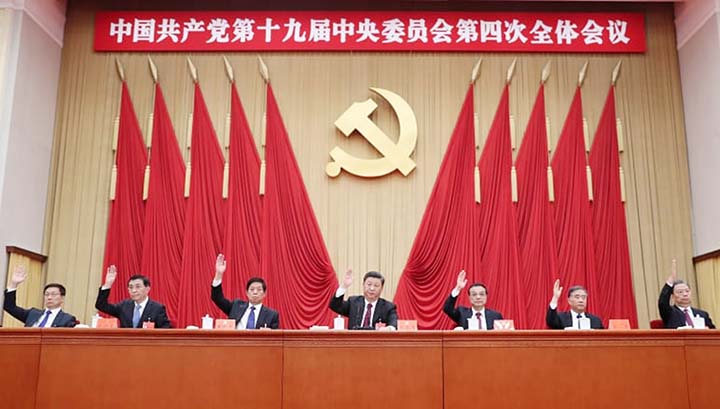
AFP, Beijing :
China warned Friday it would not tolerate any challenge to Hong Kong’s governing system, as it laid out plans to boost patriotism in the city and change how its leader is chosen or removed after months of pro-democracy protests.
The unrest in the semi-autonomous city was an important topic at a major, four-day meeting of the Communist Party chaired by President Xi Jinping this week in Beijing, said Shen Chunyao, director of the Hong Kong, Macau and Basic Law Commission.
The central government in Beijing has so far voiced its confidence in Hong Kong chief executive Carrie Lam and the city police to put a lid on the increasingly violent protests.
But all eyes have been on whether the party leadership will assert more control over the situation if the demonstrations spin out of control.
The former British colony has been rocked by months of protests with citizens lampooning the city’s pro-Beijing leaders and erosion on basic rights.
Shen said party leaders agreed to “further improve the central government’s system of governance over the region” and maintain its “long-term prosperity and stability.” China, he added, will “never tolerate any act that challenges the bottom line of ‘one country, two systems’, never tolerate any act that splits the country and endangers national security, and resolutely prevent and contain foreign forces’ interference in Hong Kong and Macau business.”
Hong Kong’s chief executive is not directly elected, a source of major friction and a headache for the leaders themselves because they have no popular mandate.
Currently the city’s leader is chosen by a 1,200-strong committee that is stacked with Beijing loyalists.
Lam, who now boasts record low approval ratings, became leader in 2016 after securing 777 votes from that committee.
Shen said the party leaders discussed ways “to improve the mechanism of appointing and removing the chief executive and key officials of the Special Administrative Region by the central government.”
The legal system of the city will also be improved to “safeguard national security,” he said, without providing more details. The party elite have decided to step up patriotic education as a way to curb youth-led protests.
“We should educate Hong Kong and Macau society, especially public officials and teenagers, about the constitution… and strengthen the national consciousness and patriotism of Hong Kong and Macau compatriots through the education of history and Chinese culture,” said Shen. The Basic Law is Hong Kong’s mini-constitution which governs its relations with Beijing.
Hong Kong and Macau society, especially civil servants and young people, must improve their “patriotic spirit” and knowledge of China’s history and culture, Shen added. “In short, we will further improve the central government’s system of exercising full administrative power over the Special Administrative Regions in accordance with the constitution and the Basic Law,” he said.
The party will “firmly safeguard national sovereignty, security, and development interests, safeguard the long-term prosperity and stability of Hong Kong and Macau, and will not tolerate any challenges to the bottom line of ‘one country, two systems’,” Shen said.
The party “will not tolerate any act of splitting the country or endangering national security, and resolutely prevent and contain external forces from interfering in Hong Kong and Macau affairs and carrying out separatist, subversive, infiltration or destructive activities.”
He gave no details of any specific policy steps Beijing might take.
China denies meddling in Hong Kong and has accused foreign governments, including the United States and the U.K., of stirring up trouble.
China has also quietly more than doubled its deployment of mainland security forces in Hong Kong, according to foreign envoys and security analysts, in a dramatic move by Beijing to prepare for a potential worsening of the unrest.

